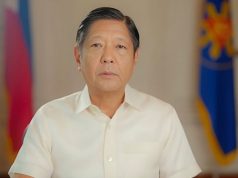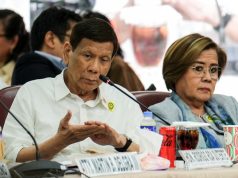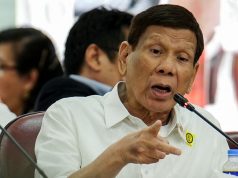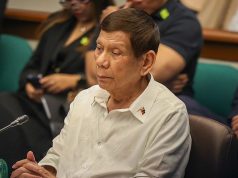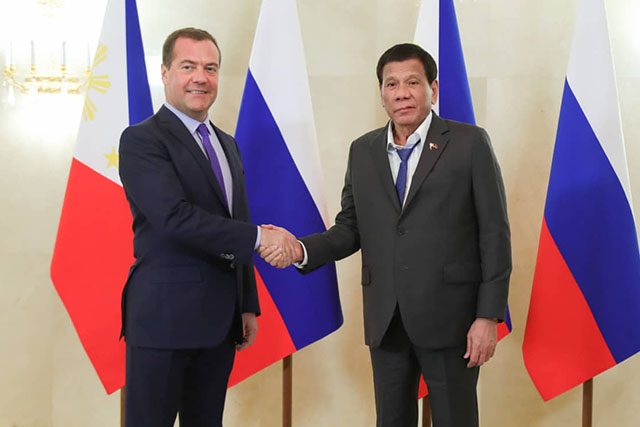
An editor of national public radio in the Czech Republic claimed the Russians were “having a blast” with how President Rodrigo Duterte carried himself in a photo with Russian Prime Minister Dmitry Medvedev.
Pavel Vondra shared a picture of the chief executive shaking hands with Medvedev before their bilateral meeting took place with other public officials in Moscow yesterday.
“Rodrigo #Duterte showed up a bit unkempt for the meeting with the Russian PM (prime minister) Medvedev in Moscow and the Russian internet is having a blast,” Vondra wrote on Twitter.
Attaching a screenshot from what appeared to be a comments thread in the microblogging platform, Vondra claimed the Russians were saying the following about Duterte:
“Did he drink all night?,” “Did he just leave the pub?,” “Do Filipinos know what a (state visit) protocol is?”
Rodrigo #Duterte showed up a bit unkempt for the meeting with the Russian PM Medvedev in Moscow and the Russian internet is having a blast: "Did he drink all night?", "Did he just leave the pub?", "Do Filipinos know what a (state visit) protocol is?" people ask. #DuterteInRussia pic.twitter.com/U823KExjDW
— Pavel Vondra (@pavelvond) October 2, 2019
It could be noted that compared to Medvedev’s suit, Duterte’s attire seemed “sloppy,” according to former Presidential Communications Undersecretary Manuel Quezon III.
A Twitter user even shared a zoomed-in picture of the chief executive’s suit, particularly the unbuttoned asymmetrical collar which revealed the upper part of his tie.
😤🤦🏽♂️ pic.twitter.com/Iqv2D9bviu
— Joseph Van Ness (@edjStark) October 2, 2019
In contrast, Medvedev’s collar was fully buttoned up to accommodate a neat knot and hide the other parts of the tie.
In fashion, it is called the Windsor knot, which is considered the “power tie” men usually sport in formal settings, according to The Business Journals.
“The man who utilizes a full Windsor knot is very formal, a fashion-forward traditionalist who is self-assured. It is considered an older gentleman’s knot—it has a presidential feel,” Alan Vinson, a men’s custom Florida-based clothier, said.
Meanwhile, some Filipinos who saw Duterte’s suit, particularly how his necktie was worn, shared their reactions on the microblogging platform.
Wala bang stylist yung presidente??? This is how they please the masses — that he is simple to a fault and very relatable at that. Pero naman, we’re fast becoming the laughingstock of politics and dignitaries.
— K (@Legally_K) October 3, 2019
Nakakahiya. Our head of state could at least have worn a real tie and buttoned up his shirt befitting a state visit. An observance of protocol and respect for others are missing in this man. Then again, what do we expect from a tyrannical bumpkin? https://t.co/YFiU31VWwP pic.twitter.com/LQIRICz6VY
— Miss Maggie (@MiaMagdalena) October 3, 2019
There were also others who defended Duterte, speculating that he might not be able to “breathe well” if the collar was fully buttoned.
“Have you heard of the term don’t judge the book by its cover? Probably the old man can’t breathe well with (a) closed tight shirt,” a Twitter user said.
Another user pointed out that Duterte cannot be judged by his sole attire since some businessmen and politicians are still “greedy” despite wearing “snappy suits.”
Duterte previously shared that he does not dress to “impress” but rather, to feel “comfortable.”
He uttered the remarks when he was criticized for wearing a creased Barong Tagalog during the 31st Association of Southeast Asian Nations Summit in 2017.
“I dress to be comfortable, not to impress anyone,” Duterte said before.
“I was there presiding, not to please the figures, the prime ministers and presidents. Dito lang ako comfortable,” he added.
Duterte is currently in Russia for an official visit upon an invitation from Russian President Vladimir Putin, who he described as his “idol” and “hero” during his early years of presidency.
On presidential outfits
Public officials, especially heads of state, are always expected to appear professional to exude an air of authority and dignity since they are acting as representatives of the people they govern.
“A suit indicates a serious commitment—it is a formal statement that you take the job and world seriously,” John Murphy, a communications professor at the University of Illinois, said.
“That means a tailored suit,” he added.
For fashion scholar Anne Peirson-Smith of the City University of Hong Kong, presidential outfits are “visible expressions of power and the power relations” that are being “played out” on a “globally mediated stage.”
She added that politicians can add fashion “to the political agenda as an intentional, strategic way of managing personal style to enhance credibility” and to “ensure support” from the public.
Dr. Peirson-Smith also suggested that fashion is a symbolic system that can “communicate identity, conformity and rebellion.”





